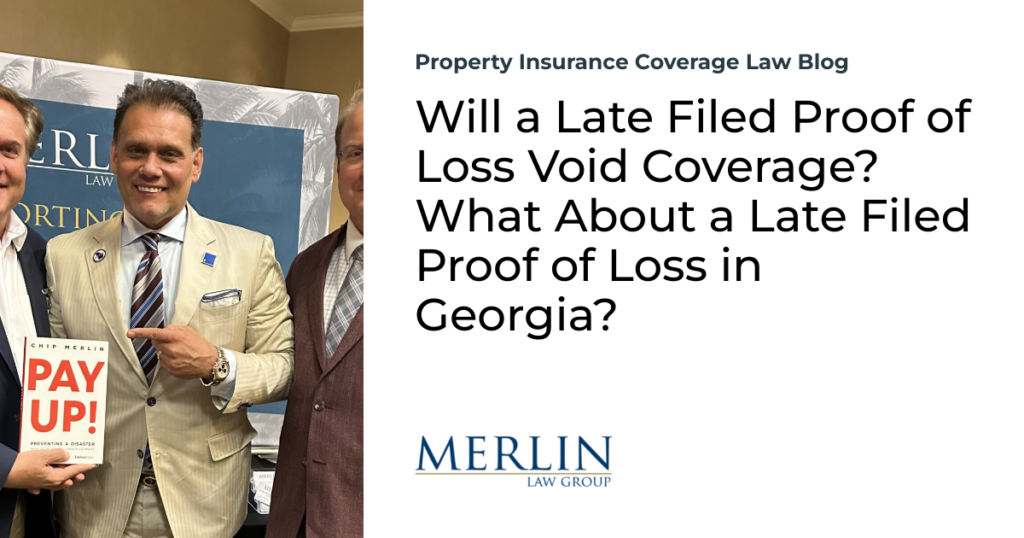Will a Late Filed Proof of Loss Void Coverage? What About a Late Filed Proof of Loss in Georgia?

Late filed proofs of loss are treated differently by state and federal law. Some are draconian, where a proof of loss filed one day late may void coverage, as noted in Attention Public Adjusters: Urgent Reminder on Upcoming Deadline for National Flood Proofs of Loss. Some states require the insurer to prove prejudice as noted in Late Filed Proof of Loss – Does Delay Result in Denial?
How does Georgia treat a late filed proof of loss? A Georgia federal case had an entire discussion on the topic, suggesting that a late filed proof of loss may not necessarily prevent recovery depending on the circumstances:1
“Defendant’s agent provided three sworn proofs of loss to Plaintiff on July 17, 2017. On July 21, 2017, Plaintiff sent Defendant edited proofs of loss that included additional amounts Plaintiff believed were covered by the Policy. Defendant rejected the edited proofs of loss on August 5, 2017. In so doing, Defendant noted that ‘any altered document will be rejected.’ Thus, because Plaintiff did not agree with the total amounts provided in the proofs of loss prepared by Defendant and Defendant would not accept edited documents, Plaintiff’s only choice was to continue to work with Defendant to come to a resolution regarding the correct loss amount. The undisputed record evidence demonstrates that Plaintiff tried to communicate with Prislupsky and sent multiple emails asking about the status of its claim and whether Defendant needed any additional information. In contrast to Plaintiff’s continuous attempts to engage Defendant, Defendant ceased all communications with Plaintiff after Prislupsky’s August 28, 2017 email.
Plaintiff has shown a genuine issue of material fact as to whether its failure to provide the proofs of loss is excusable. The facts demonstrate that Plaintiff actively engaged and cooperated with Defendant to reach an agreement regarding the total amount of various categories of losses. Defendant rejected Plaintiff’s informally edited proofs of loss and ceased communications with Plaintiff before the parties reached an agreement. This set of facts stands in stark contrast to the cases Defendant cites, where summary judgment was granted in favor of insurers when insureds failed to provide proof of loss. See Cagle v. State Farm Fire & Cas. Co., 236 Ga. App. 726, 727, 512 S.E.2d 717 (1999) (insurer provided insured with personal property inventory forms for insured to complete and contacted insured about forms multiple times to no avail); Buffalo Ins. Co. v. Star Photo Finishing Co., 120 Ga. App. 697, 701-03, 172 S.E.2d 159 (1969) (insured did not provide notice of loss until insured’s demand for payment, which was made three days prior to filing suit and six days prior to expiration of the 12-month policy limitation for bringing suit). Here, the facts suggest that Defendant, not Plaintiff, prevented the claim from moving forward. Therefore, a jury must decide whether Plaintiff is excused from failing to provide the proofs of loss for Business Personal Property and Business Income/Extra Expenses. Fremichael v. Doe, 221 Ga. App. 698, 701, 472 S.E.2d 440 (1996) (holding that ‘whether there was justification for [insured’s] failure to submit a sworn statement [is an] issue[ ] for determination by a jury’).”
Brandon Lewis presented at the Georgia Association of Public Insurance Adjusters (GAPIA) and noted that many personal lines policies require filing a proof of loss within sixty days. His proper advice was to do everything possible to provide that proof of loss within the time frame or obtain an extension. He suggested providing as much documentation as possible, be as accurate as possible, and at least provide a supported gross measure of loss in the proof of loss that can be explained,
Proof of loss requirements are an important post-loss obligation that must always be carefully read to determine if there is a time frame requirement. The best practice is to provide a proof of loss on time or obtain an extension in writing by an authorized individual. Georgia is a state that seems to allow some wiggle room to avoid a timely filing of a proof of loss, but the best practice is to avoid the situation altogether.
Thought For The Day
Better three hours too soon than a minute too late.
—William Shakespeare
1 Crazy Cuban, LLC v. AmGUARD Ins. Co., 437 F.Supp.3d 1261 (N.D. Ga. 2020).







